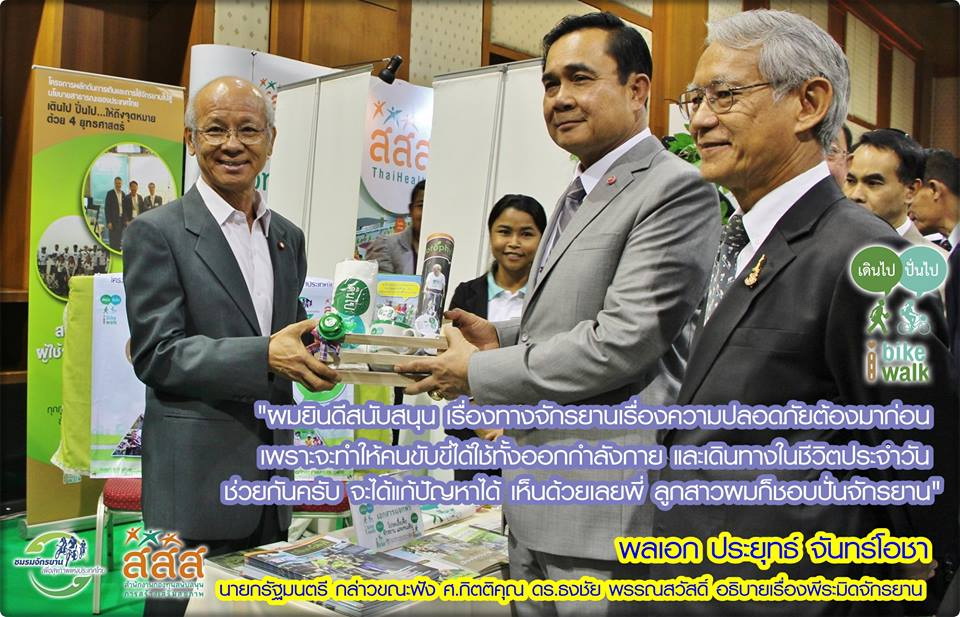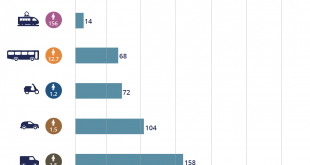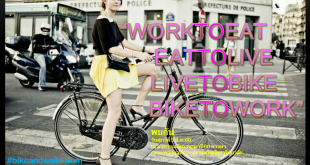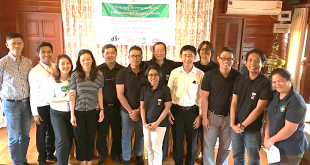Thai Prime Minister talked about cycling promotion broadcast all over the country through TV Pool
On the night of October 3 and 10, 2014, General Prayut Chan-ocha, Prime Minister of Thailand, talked about cycling promotion in his weekly Address-To-The-Nation-style Friday Night TV programme called “Return Happiness to People in the Nation” which was broadcast all over the country through the TV Pool where he told Thai people what the government had done or achieved and government policies. It was the first time that a Prime Minister of Thailand talked about cycling promotion, especially cycling in daily life, concretely, even publicly ordering government agencies, particularly the Ministry of Interior, to take actions.
Thailand Cycling Club (TCC), which had been working actively in the past four years to advocate walking and cycling in daily life as a public policy, see the PM’s speech as a very positive sign for our advocacy work
On October 3, he said that he was glad to see people happy cycling for exercise. “I want people to pay more interest to cycling. It is very good whether it is for daily commuting or just for exercise. This government has a policy to promote and support (cycling)… We would speed up promoting safe bicycle routes, so that there would be more people cycling everywhere in all regions. We may connect these routes to create bicycle routes for travelling, tourism, exercise, anything; whether it is for adventure tourism or just cycling for sightseeing the city or cycling for conservation, not destructive to the nature and environment, and help the country save energy, reduce pollution and preserve the environment. This (cycling promotion) should be in all provinces and all areas. I would like to ask government officials in every province, every ministry, every department to help organize it. The Ministry of Interior remains the core on this matter….”
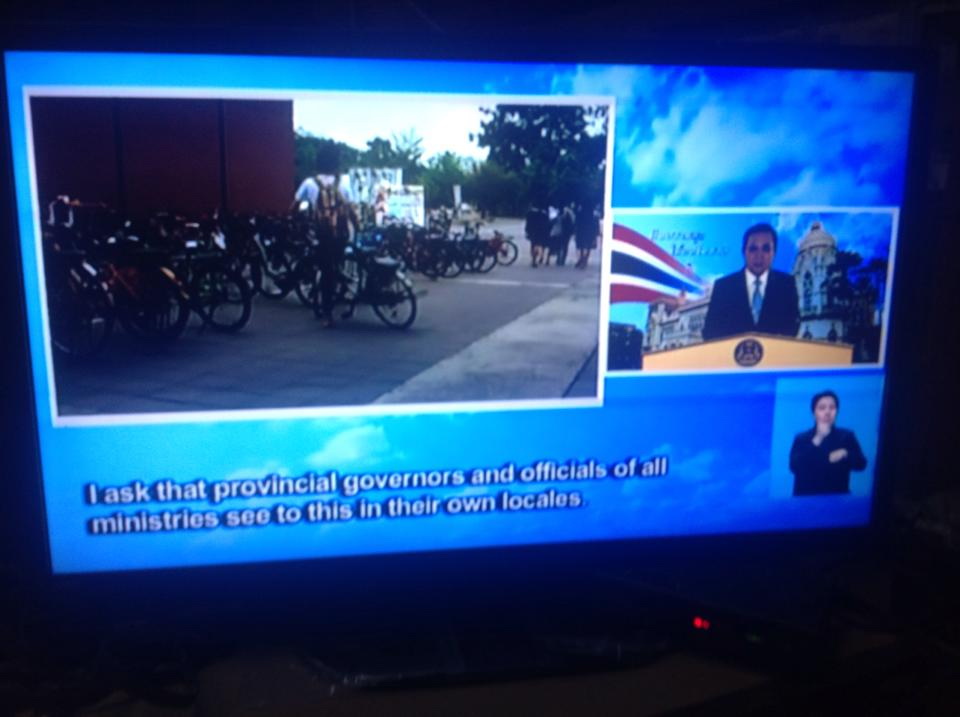 |
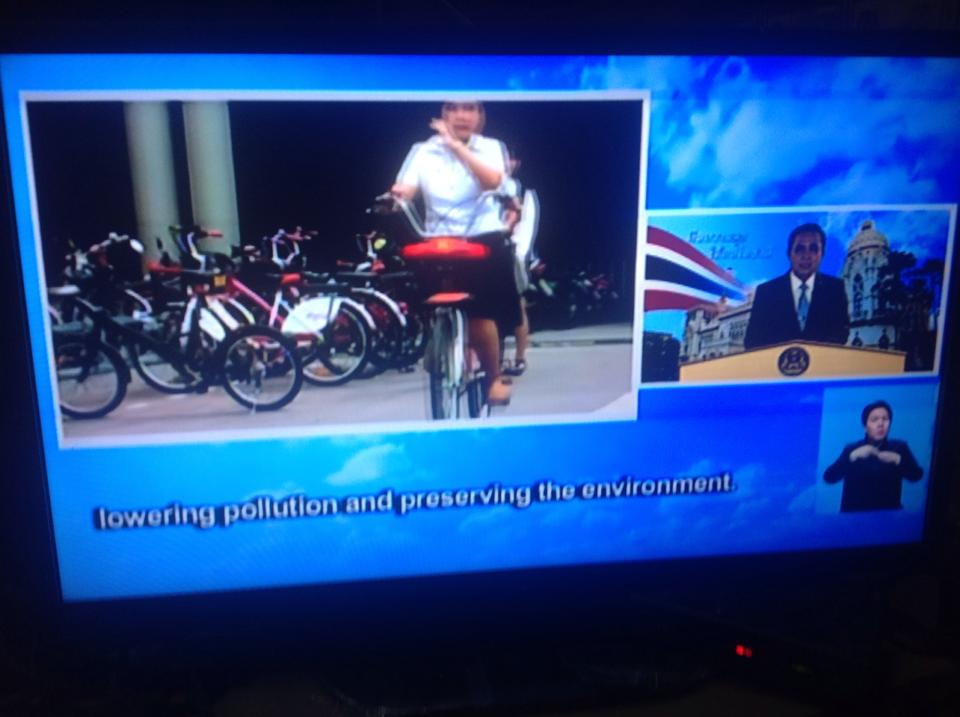 |
|
Televised Prime Minister’s speech on October 3, 2014. |
|
On October 10, he referred to his last week speech about a government policy to encourage people to cycle for exercise or as a means of transport in their daily life. “It is likely that bicycle could be used only in some areas; it would not be possible to cycle to work everywhere, but (I) would like to promote more use of bicycles, promote convenience and safety for cycling. Today I receive good responses. Many government agencies have arranged additional areas, additional places for cycling, at least for health or at least to reduce air pollution and noise pollution temporarily for a while.
“Moreover, cycling would give us opportunities to have more relations. Neighbours, people in communities, in lanes, have opportunities to park their bicycles to talk to each other because so far when we drive cars, we close windows, turn on air-conditioning. This increases pollution and we do not have conversation, do not talk to each other. If we have opportunities to talk to each other, we would love each other very much, do not have conflict with each other anymore.
“Moreover, I want small shops in communities along bicycle routes to get supports, so that they would have goods to sell. (People who cycle) would visit these shops, buy things, have conversation conveniently and need not waste time going to big malls. Goods that are produced in local areas should have spaces to sell along bicycle routes to receive concrete results and greatest benefits for society.
|
General Prayuth Chan-ocha, Thailand’s Prime Minister, receive souvenirs from Prof. Thongchai
|
“It must start with setting standards for “bike lanes”. What should they be? How many lanes? Materials? Networks to connect points to give cyclists safety, facilities, parking places that are convenient and safe. There may be bicycles for rent or free service, depending on how much progress can be made. Every agency should support this. Especially in terms of rent bicycles to use for studying, children must be taught discipline, how to correctly use bicycles. When they grow up to ride motorcycles, to drive cars, they would not disobey traffic law.
“In terms of conservation-oriented tourism, some routes that are inconvenient to use cars or other vehicles, we use bicycles, may be mountain bikes to visit waterfalls, places that need not expand routes. For some waterfalls, it should be routes to cycle or walk up there like it is done in other countries. When we visit mountains, we go there for health. Everyone can walk, can climb, can cycle up the mountain. There is no need to drive up everywhere. When route is expanded, there would be too much cars, quality cannot be controlled.
“In the previous meeting of the government cabinet and the National Council for Peace and Order (NCPO), (I) asked Ministry of Transport and other government agencies to plan a pilot project in all areas, developing existing routes or do additional works to complete the soonest. I want to have it all over the country, both in Bangkok and all provinces. I would like to ask car or motorcycle users to be careful with bicycle riders. Roads must be generously shared in appropriate periods of time.”
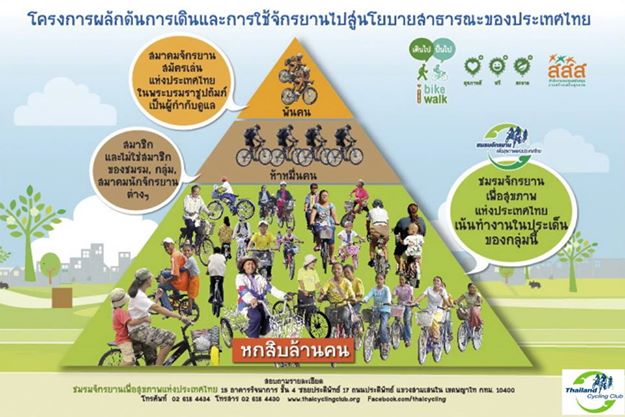 |
|
The Bicycle Users’ Triangle/Pyramid that Prof. Thongchai showed the Prime Minister (Source: TCC leaflet “How Many Kilometers People Cycle in a Day”) |
Just one week before the Prime Minister talked about cycling on television, that was on September 26, 2014, Thailand Cycling Club (TCC) was invited to set up a booth at the Annual Meeting of Office of the National Economic and Social Development Board (NESDB) where the Prime Minister gave a keynote speech on “Human Development for National Development”. When he walked back after finishing his speech, the PM stopped at TCC booth, giving a brief opportunity for Professor Emeritus Thongchai Panswad Ph.D., TCC President, to tell the PM what TCC had been doing. Central to his presentation was the ‘Bicycle Users’ Triangle/Pyramid’.
The ‘Bicycle Users’ Triangle/Pyramid’ is divided into three levels. At the top of the triangle/ pyramid are bicycle racers of which there could be about 1,000 in Thailand; they are people who can win medals in international tournaments, giving the country pride, honour and fame. In the middle level are cyclists who use bicycles for exercise and recreation. There may be 200,000 of them in the country. These people can create colourful social movements. At the base of triangle/ pyramid are bicycle users who use bicycle for travelling in general in their daily life. There are tens of millions of them. TCC focuses on working with this last group, some of whom are also cyclists and bicycle racers. Cycling as a means of transport can help the country solve several problems, including environment problems, energy problems, traffic problems, economic problems and social problems. The government, therefore, should consider giving supports to create safety, connectivity and factors that help facilitate cycling in daily life for majority people of the country.
The Prime Minister replied briefly that “I agree with you, brother. My daughter also likes to cycle. I am glad to support about bicycle paths. Safety must come first because that would enable (bicycle) riders to use bicycles for both exercise and travelling in daily life. We help each other, so that problems could be solved”. He then received a package of souvenirs from, and had a photo taken with, Prof. Thongchai and then walked away.
Even though TCC has no definite proof, there are reasons to believe that this brief conversation did attract the Prime Minister to be interested in cycling issue, especially cycling in daily life, to an extent that he later talked about it in his weekly addresses, brought it up in the meetings of the government cabinet and the NCPO, and then ordered government agencies to take actions, only a week later and twice consecutively in his weekly address to the nation. So this is another TCC’s victory in its advocacy for a public policy that promotes and supports cycling in daily life and its drive to make the Fifth National Health Assembly’s resolution on “Systems and Structures for Promotion of Walking and Cycling in Daily Life” materialized.
Reported by Gawin Chutima
Committee Member, Thailand Cycling Club
 ชมรมจักรยานเพื่อสุขภาพแห่งประเทศไทย ชมรมจักรยานเพื่อสุขภาพแห่งประเทศไทย
ชมรมจักรยานเพื่อสุขภาพแห่งประเทศไทย ชมรมจักรยานเพื่อสุขภาพแห่งประเทศไทย
